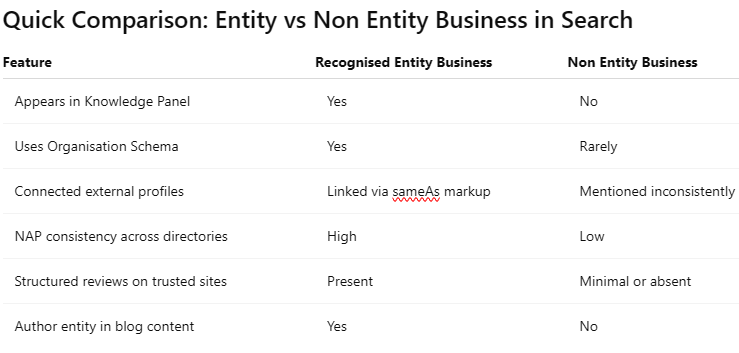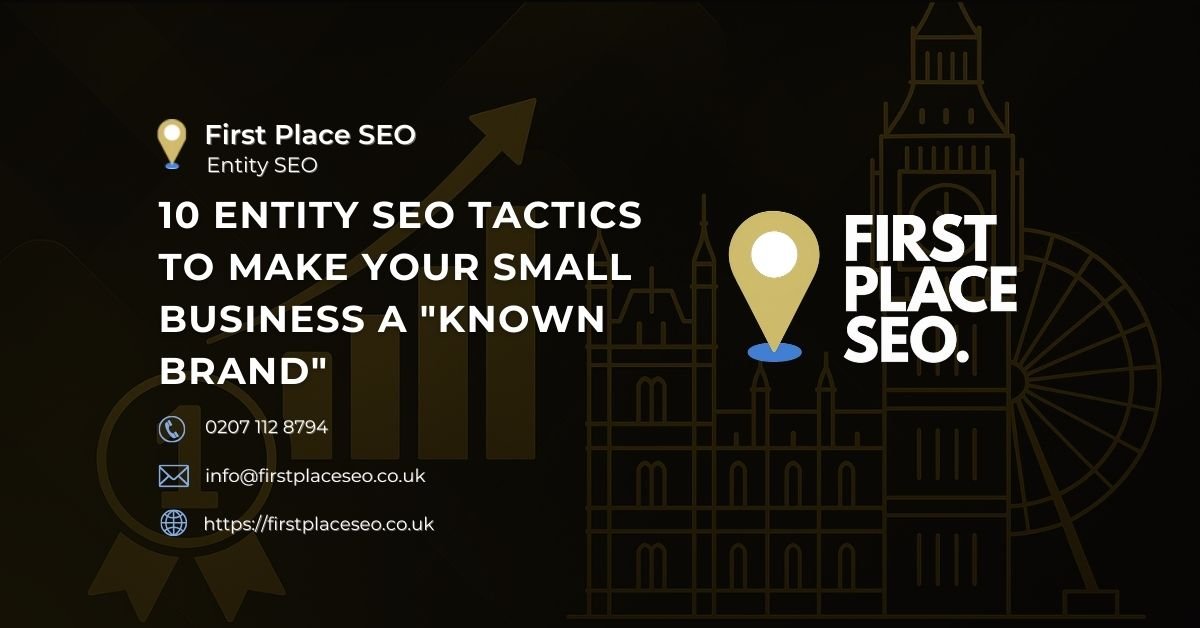What is Entity SEO and why does it help small businesses rank higher?
Entity SEO helps Google view your business as a recognised, verified identity rather than just a web domain. When your business is structured this way, it benefits from higher rankings, stronger visibility in knowledge panels, and better relevance in related searches. This makes it easier for potential customers to find and trust you.
Entity SEO connects your brand to the Google Knowledge Graph using structured signals like schema markup, consistent business citations, and trusted online references. These help search engines understand your business contextually, including who you are, what you offer, and how you relate to other verified identities and semantic entities.

Here's What We Have Covered In This Article
1. Add Organisation Schema to Your Homepage
Organisation Schema is structured data you can add to your homepage. It helps Google identify key details about your business:
-
Business name
-
Logo
-
Website URL
-
Physical address
-
Contact number
-
Date founded
Adding this in JSON LD format supports entity recognition and connects your brand to topic associations in the Knowledge Graph.
2. Link to Trusted Profiles Using sameAs Markup
sameAs markup helps Google connect your site to trusted external references. These may include:
-
Companies House
-
LinkedIn company page
-
Trustpilot
-
Google Business Profile
-
Social media accounts
This method strengthens your semantic business profile and improves consistency across your digital brand presence.
3. Create an About Page That Builds Entity Signals
Your About page is a key semantic trust indicator. Use it to outline:
-
What your business offers
-
Operational regions
-
Team leadership and founding background
-
Industry certifications or media recognition
This content forms the foundation of your verified identity and supports Google’s understanding of your topic relationships.
4. Use Consistent NAP Across All Listings
NAP consistency, Name, Address, Phone, is one of the strongest search engine identity signals. Make sure your contact info is:
-
Exactly matched across your website and all directories
-
Present on platforms like Google Business Profile, Yell, Yelp UK, and Hotfrog
-
Verified on key citation sources like GOV.UK
Consistency supports brand classification and local entity trust.
5. Get Featured on Trusted UK Platforms
Trusted listings validate your semantic business identity. Target:
-
Companies House
-
GOV.UK Business Directory
-
Yell
-
Checkatrade
-
Hotfrog
-
Trustpilot
-
Yelp UK
These external mentions confirm you as a recognised organisation with a credible presence in the UK business ecosystem.
6. Encourage Verified Reviews
Reviews with keywords and local references reinforce your reputation and entity trustworthiness. Request feedback on:
-
Trustpilot
-
Google Business Profile
-
Reviews.co.uk
Encourage reviews to include what service was used, where, and by whom. This builds your online reputation signals and supports structured business profiling.
7. Use Your Brand Name in Page Titles and H1s
Consistently include your brand name in:
-
Homepage H1 and title tag
-
Service page headers
-
Meta descriptions
This approach links your brand to specific service areas and improves your position in knowledge based listings.
8. Establish an Author Entity for Blog Content
Create a recognisable author entity by:
-
Using the same author name and profile photo on all posts
-
Linking to an author archive with a bio and role
-
Connecting that author to a verified LinkedIn account or professional page
This supports E E A T and helps search engines evaluate author trust signals.
9. Get Mentioned on Other Trusted Websites
Aim to be referenced on websites that are semantically relevant to your niche. Examples:
-
Supplier websites
-
Local business networks
-
Trade associations
-
Industry blogs
These mentions reinforce your digital brand consistency and serve as third party corroborations for your business identity.
10. Claim and Optimise Your Google Business Profile
To strengthen your search engine validation:
-
Use accurate categories and descriptions
-
Add photos, Q and A, and service highlights
-
Keep opening hours and updates current
-
Encourage keyword relevant reviews
Together, these reinforce your local semantic authority and brand prominence.
Other Structured Data Types That Help
Extend your schema beyond Organisation Schema to boost semantic indexing:
-
LocalBusiness Schema for location based relevance
-
Product Schema for ecommerce or physical goods
-
Service Schema for defined offerings
-
Review Schema for embedded rating signals
-
FAQPage Schema to match “People Also Ask” queries
These reinforce topic clusters and help structure your search engine identity.
Pro Tip : Keep GBP posts fresh and keyword relevant; stale content rarely triggers snippets.
Get More Clicks from Google Maps
We optimise your profile so justifications appear more often and attract customers.
How can you tell if Google recognises your business as an entity?
Search your business name and look for:
- Knowledge Panel or Brand SERP
- Structured snippets from your review platforms
- Grouped results showing your website, social accounts, and citations
To explore deeper:
- Use Kalicube Pro or InLinks Entity Checker
- Try Google API Explorer to assess Knowledge Graph presence
Recognition indicates you are seen as a classified and semantically connected brand.
UK Specific Trust Platforms That Help
To support Google’s understanding of your verified business identity, register with:
- Companies House
- GOV.UK Business Directory
- Yell
- Trustpilot
- Hotfrog
- Yelp UK
- Checkatrade
These act as national validation nodes and increase confidence in your brand’s legitimacy.
Pro Tip: Use FAQs on your site to target search terms that Google often highlights in justifications.
Speak to a Local SEO Specialist
Unsure why your business is missing snippets? Talk to an expert who knows how to trigger them.
Why justifications sometimes don’t appear
Justifications are never guaranteed to display. They can disappear for reasons such as:
- The user’s proximity to your business.
- The search wording and intent.
- Limited supporting data from your profile or site.
- Google testing or rotating features.
- Display differences between mobile and desktop.
For example, you may see a review snippet for “SEO Companies near me” but not for “SEO prices” This variation is normal and reflects search context and justification eligibility factors.
Counterpoint: When justifications work against you
Google does not always highlight positive language. Occasionally a snippet may pull a phrase from a review that is less flattering, such as “Their reviews mention slow service.” This shows the importance of consistent review management.
Do justifications help local SEO performance?
Although they do not influence ranking, justifications help performance by improving conversions. They add context that builds trust and makes your listing more persuasive. Studies of click behaviour, heatmaps, and local buyer confidence show that listings with added detail receive more clicks. Like review stars or sitelinks, they act as credibility snippets that give your business an advantage in the Local Pack.
This is where snippet performance Google monitoring becomes useful. Justifications add a persuasive layer of local search persuasion techniques that make your listing more competitive.
How to monitor justifications (free tools and pro tips)
Because justifications are dynamic, tracking them is useful. You can:
- Use monitoring tools such as Local Falcon, BrightLocal, or SEO Minion for SERP simulation.
- Test searches manually in incognito mode or with a VPN.
- Record results in a spreadsheet to track justification volatility.
- Watch review sentiment to see if new wording triggers fresh snippets.
Step by step method for manual checks
- Open an incognito browser window.
- Use a VPN or location tool to simulate a search from your service area.
- Search your main keywords and record whether justifications appear.
- Log these results in a spreadsheet over time to track patterns.
Including terms like Google business profile snippet in your checks ensures consistency with how users and search engines reference this feature.
Use justifications to make your listing stand out
Justifications can make your business look more relevant and reliable in the Map Pack. Even if you are not in the top position, a strong snippet can secure the click. Aligning your Google Business Profile, website content, schema markup, and reviews increases the likelihood of earning them.
By treating justifications as part of your wider business profile enhancements, you can win more clicks in the Map Pack and strengthen your local search visibility.

